Over the past couple of days, I've been blessed with the opportunity to watch both Game 6 of the 2011 World Series in which the St. Louis Cardinals came back to win in extra innings over the Texas Rangers, and third baseman David Freese was able to hit a clutch triple to tie it up late in the ninth down two outs against Neftali Feliz, and he also hit a game winning home run to propel the Cards to a game 7, as my hometown team, the Cardinals would go on to win the 2011 World Series. That game had gotten off to a slow start, as there were several fielding errors early on, but had a brilliant build-up and ending, as the Comeback Cardinals were resilient in their victory over the Rangers. David Freese absolutely dominated in this game, especially in crunch time.
I also was able to watch Game 6: The Movie, which is a documentary showing game 6 of the 1998 NBA Finals between the Chicago Bulls and the Utah Jazz, as shown from director Jason Hehir. It was fun to re-watch that basketball game. Obviously, Michael Jordan was dominant, including in the last 40 seconds of the game, and he scored 45 points and was able to get a clutch steal by ripping the ball away from Karl Malone to get a crucial offensive possession late in this contest.
Karl Malone also played very well for the Utah Jazz, but some interesting observations were that not only did Scottie Pippen have back problems, but so did John Stockton in this game. The Bulls and Jazz were both two of the older teams in the NBA, and so both teams were battling injuries and the war of attrition in Game 6. Antoine Carr had really good second quarter for the Jazz, as he was making mid-range jumpers and scored off of a cut, but I didn't really notice him that much after that. Toni Kukoc also did a good job of knocking down shots for the Chicago Bulls.
Steve Kerr was a really good shooter that is one of the best spot-up shooters in NBA history, but there has been a debate of whether he could play in today's NBA. I'd like to think that he can, as his shooting is at a premium, and always has been needed by NBA teams across generations. However, he didn't help his case in this game though. He did win 3 titles with the Chicago Bulls, two more as a player with the Spurs, and three as a head coach with the Golden State Warriors, so he's a well-decorated individual in sports. In this game though, he really struggled defensively, mostly due to his athletic limitations. He tried really hard to stay in front of Howard Eisley, but he just couldn't, and Utah was often able to capitalize as a result in that game. Still, with Kerr's strong shooting skills and basketball IQ, I think he could've been a backup or a third-string PG as a Quinn Cook or as a better shooting Ryan Arcidiacono type in today's NBA.
Scottie Pippen was invaluable in his team's win, even when he was limited due to a bad lower back injury. He was able to rotate to poke balls and deflect passes to get steals, he also blocked Adam Keefe's shot, and he also excelled as a low post scorer. He mainly was used to throw entry passes to help get Michael Jordan the basketball, but his strong defensive skills still helped the Bulls significantly, even in a limited capacity. Pippen delivered when his team needed him the most, and the Bulls were a clearly better team with him on the floor even in the condition he was in.
Dennis Rodman was able to score on a couple of tip-ins in the third quarter, and he also made a 20-footer late in the game. Also, Utah Jazz's big men, Adam Keefe and Greg Foster played for quite awhile, and they were not very useful at all in this game. Announcer Isiah Thomas suggested for the Bulls to run a post play for Luc Longley in the third quarter as he hadn't shot the ball yet, Longley proceeded to later miss a mid-range shot badly later in this contest.
Some controversial calls or no-calls also went down, too. The Bulls were whistled for a lot of illegal defense calls, and it seems that they couldn't have possibly committed that many of them in this game. In the 1990s, the rules forbade players to help down inside the post away from the ball before the post player received the basketball. If a defending player was standing away from the ball, they had to be above the free throw line. In today's NBA, Chicago Bulls' defense would've been perfectly acceptable.
Utah Jazz's backup point guard, Howard Eisley also appeared to make a three that was waved off due to a shot clock violation, which could not be reviewed because 1990s basketball did not have instant replay.
As for whether or not Michael Jordan pushed off or not, I don't think he did. Bryon Russell seemed to be falling over on his own, and Jordan did a really good job of faking Russell out of his shoes to make the go-ahead winning basket to get the 1998 Chicago Bulls the series win and their 6th NBA championship.
I enjoyed watching both games. The camera view from Game 6: The Movie was very close to the court, and so it was hard at times to watch the action off the ball, and there would be some surprise scores from players off cuts. It was an exciting game that also showed an unbiased, honest look at Game 6 of the 1998 NBA Finals in High-Definition (HD). Thanks for reading this. Feel free to follow me on Twitter @AlanLuSTL.
 |
| Chicago Bulls' legendary guard, Michael Jordan makes the game-winning shot over Utah Jazz's forward, Bryon Russell to propel the Bulls to win their 6th NBA championship in the 1998 NBA Finals. (Photo: Nathaniel S. Butler/NBAE via Getty Images) |
I also was able to watch Game 6: The Movie, which is a documentary showing game 6 of the 1998 NBA Finals between the Chicago Bulls and the Utah Jazz, as shown from director Jason Hehir. It was fun to re-watch that basketball game. Obviously, Michael Jordan was dominant, including in the last 40 seconds of the game, and he scored 45 points and was able to get a clutch steal by ripping the ball away from Karl Malone to get a crucial offensive possession late in this contest.
Karl Malone also played very well for the Utah Jazz, but some interesting observations were that not only did Scottie Pippen have back problems, but so did John Stockton in this game. The Bulls and Jazz were both two of the older teams in the NBA, and so both teams were battling injuries and the war of attrition in Game 6. Antoine Carr had really good second quarter for the Jazz, as he was making mid-range jumpers and scored off of a cut, but I didn't really notice him that much after that. Toni Kukoc also did a good job of knocking down shots for the Chicago Bulls.
Steve Kerr was a really good shooter that is one of the best spot-up shooters in NBA history, but there has been a debate of whether he could play in today's NBA. I'd like to think that he can, as his shooting is at a premium, and always has been needed by NBA teams across generations. However, he didn't help his case in this game though. He did win 3 titles with the Chicago Bulls, two more as a player with the Spurs, and three as a head coach with the Golden State Warriors, so he's a well-decorated individual in sports. In this game though, he really struggled defensively, mostly due to his athletic limitations. He tried really hard to stay in front of Howard Eisley, but he just couldn't, and Utah was often able to capitalize as a result in that game. Still, with Kerr's strong shooting skills and basketball IQ, I think he could've been a backup or a third-string PG as a Quinn Cook or as a better shooting Ryan Arcidiacono type in today's NBA.
Scottie Pippen was invaluable in his team's win, even when he was limited due to a bad lower back injury. He was able to rotate to poke balls and deflect passes to get steals, he also blocked Adam Keefe's shot, and he also excelled as a low post scorer. He mainly was used to throw entry passes to help get Michael Jordan the basketball, but his strong defensive skills still helped the Bulls significantly, even in a limited capacity. Pippen delivered when his team needed him the most, and the Bulls were a clearly better team with him on the floor even in the condition he was in.
Dennis Rodman was able to score on a couple of tip-ins in the third quarter, and he also made a 20-footer late in the game. Also, Utah Jazz's big men, Adam Keefe and Greg Foster played for quite awhile, and they were not very useful at all in this game. Announcer Isiah Thomas suggested for the Bulls to run a post play for Luc Longley in the third quarter as he hadn't shot the ball yet, Longley proceeded to later miss a mid-range shot badly later in this contest.
Some controversial calls or no-calls also went down, too. The Bulls were whistled for a lot of illegal defense calls, and it seems that they couldn't have possibly committed that many of them in this game. In the 1990s, the rules forbade players to help down inside the post away from the ball before the post player received the basketball. If a defending player was standing away from the ball, they had to be above the free throw line. In today's NBA, Chicago Bulls' defense would've been perfectly acceptable.
Utah Jazz's backup point guard, Howard Eisley also appeared to make a three that was waved off due to a shot clock violation, which could not be reviewed because 1990s basketball did not have instant replay.
As for whether or not Michael Jordan pushed off or not, I don't think he did. Bryon Russell seemed to be falling over on his own, and Jordan did a really good job of faking Russell out of his shoes to make the go-ahead winning basket to get the 1998 Chicago Bulls the series win and their 6th NBA championship.
 |
| One more look at Michael Jordan's game winning shot that he made to get the Chicago Bulls their 6th NBA championship. (Photo: Fernando Medina/ NBAE/ Getty Images) |
I enjoyed watching both games. The camera view from Game 6: The Movie was very close to the court, and so it was hard at times to watch the action off the ball, and there would be some surprise scores from players off cuts. It was an exciting game that also showed an unbiased, honest look at Game 6 of the 1998 NBA Finals in High-Definition (HD). Thanks for reading this. Feel free to follow me on Twitter @AlanLuSTL.












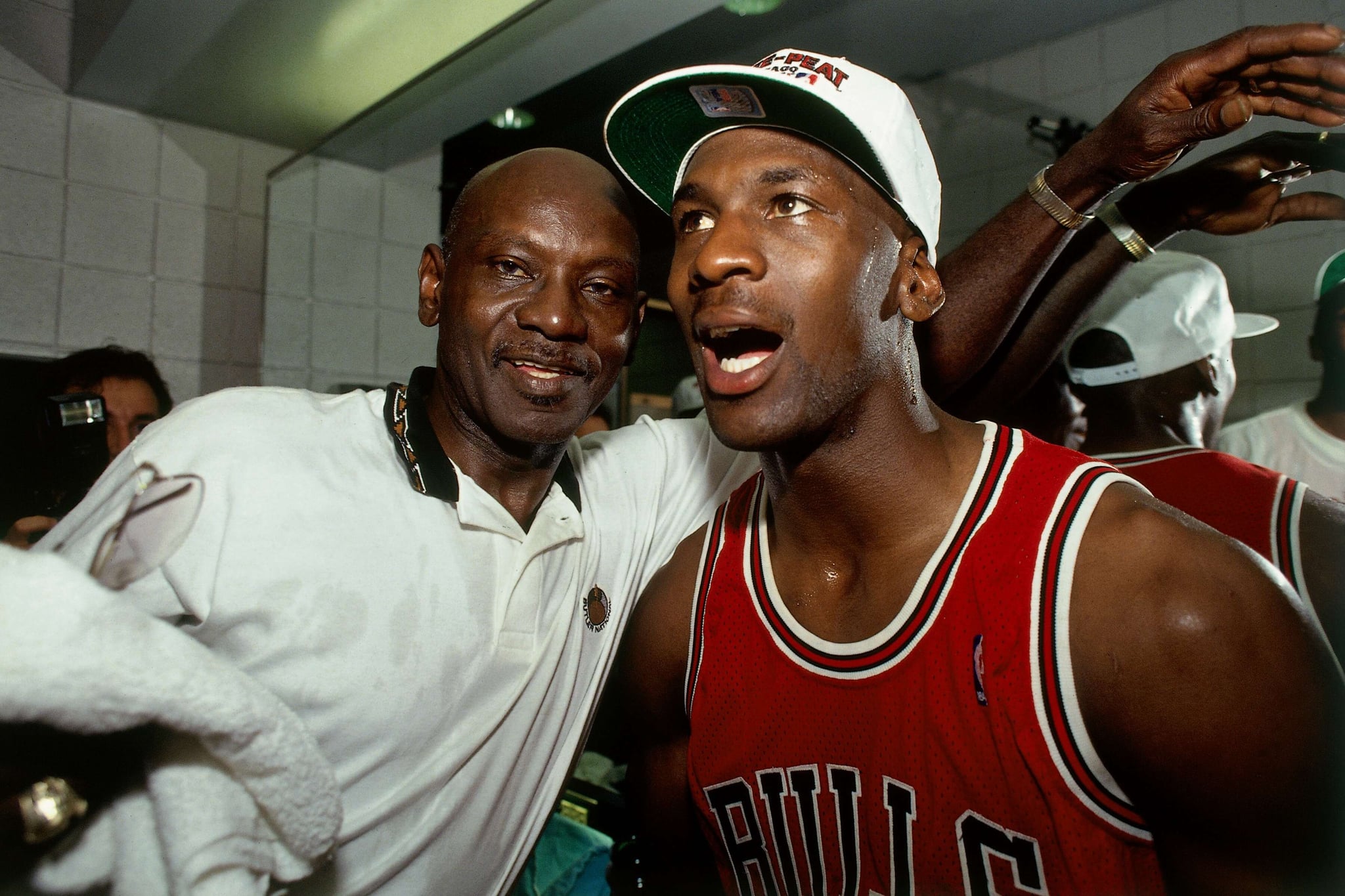
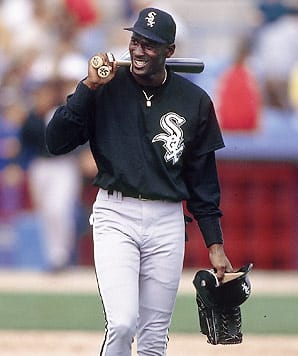


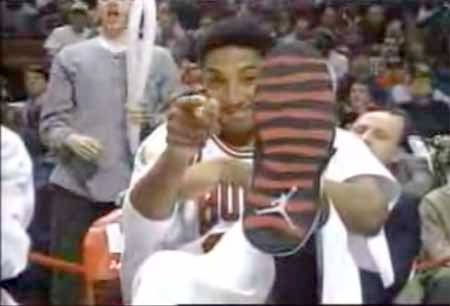













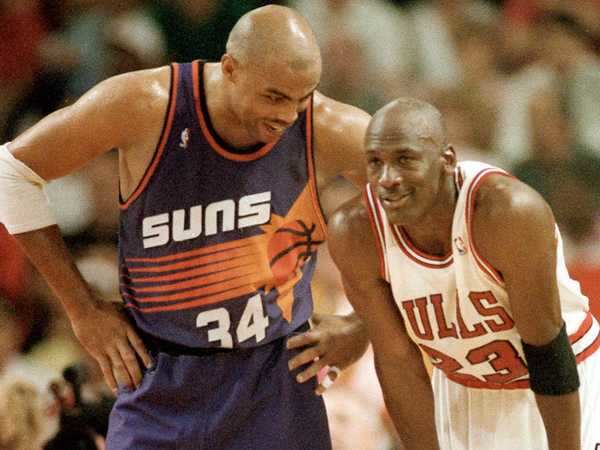
/cdn.vox-cdn.com/uploads/chorus_image/image/66682645/51895106.jpg.0.jpg)